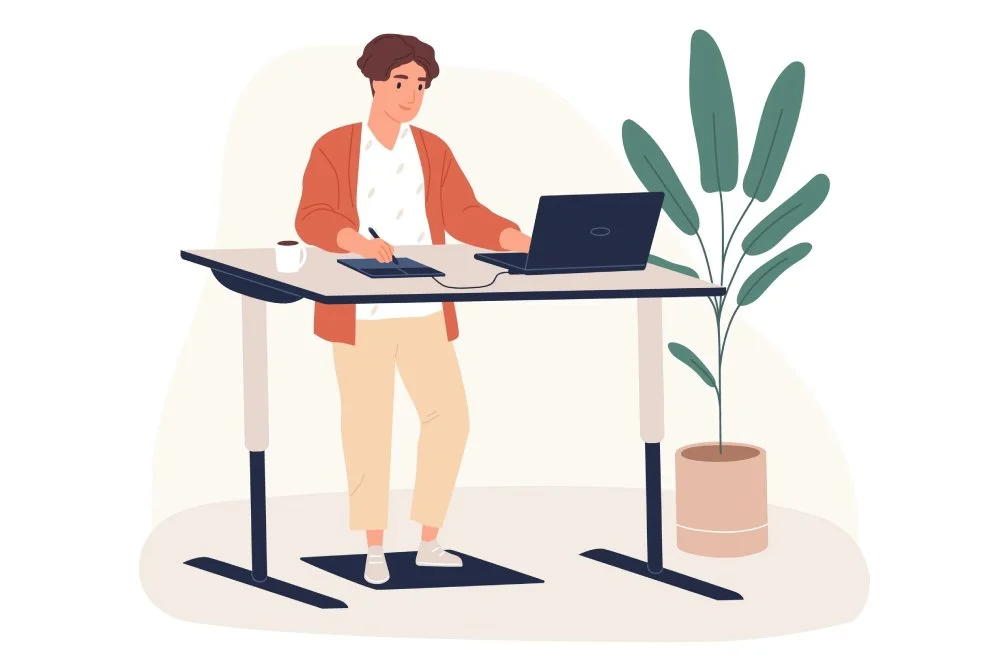For over 200,000 years, our species has evolved to dynamically use our bodies in all its functional capacity throughout the day—walking, running, squatting, sitting, lying down, etc. Unfortunately, modern life has forced most of us to sit for long extended periods of time. Even more troubling, studies of modern hunter-gatherers show our species probably did not sit like most people sit today, rather they squatted when they were sedentary which is actually a more active form of “sitting.” The bottom line is a twofold problem: in our modern world today, the way in which we sit is physiologically incorrect and we do it for too long throughout the day. Studies show that excessive modern sitting can have numerous negative effects on the body:

The Brain
Sitting for prolonged periods of time on a daily basis, without standing or moving periodically, triggers a chain reaction of unhealthy side effects. Less blood and oxygen pumps throughout the body, which slows the release of important brain chemicals and affects concentration, mood, and decision-making.
Neck, Shoulders, and Back
The longer you sit, the harder it is to maintain good posture. The neck pushes forward and shoulders round. This hunched-over position causes strain to the cervical vertebrae and cervical disc degeneration, along with muscle tension and even headaches. Sitting for extended periods of time weakens the abdominal muscles so that they cannot properly support the spine. As the spine slumps, the soft discs between the vertebrae are stressed, resulting in spinal disc degeneration and back pain over time. A slumped spine can also impact the lungs and diaphragm, creating unnatural shallow breathing patterns.
Vital Organs, Circulation, and Metabolism
Long-term sitting compromises proper blood circulation. Over time, this causes vital organs to function below optimal levels. Poor circulation from excessive sitting can also cause numbness in your legs, fluid retention, swollen veins, and contribute to life-threatening blood clots known as deep vein thrombosis.
Research conclusively shows a link between a sedentary lifestyle and cardiovascular disease as well as diabetes. Studies also show that routinely sitting for long periods of time can increase the risk of high blood pressure, high cholesterol, obesity, digestive problems, anxiety and depression, dementia, and even certain cancers.
Wiseman Health Take-Home Advice
The goal is to use your body to its full dynamic and functional capacity throughout the day. Remember, the body likes variety and movement versus long-term stasis. Here are a few ways to combat excessive modern sitting throughout the day:
- When you are sitting, always focus on proper posture and use your core back and abdominal muscles to actively support your body. Remember, proper sitting is an expansive, muscularly active process that engages your whole body and not a passive process that allows your body to fully relax and retract, which is the most common form of sitting today.
- Consider an adjustable-height work desk and try to stand more at work or at home. Do not stand in one position longer than ten minutes. An easy, affordable solution that provides a mobile standing work desk for a laptop can be found here. More expensive and substantial options for an adjustable-height work desk can be found and there are many types to meet your needs.
- If you sit for long periods of time every day, create a daily routine with multiple breaks—your goal should be to stand up and move every 20 minutes. Walk to a co-worker’s desk in place of emailing or calling. Take the stairs instead of the elevator. Take a walk at lunchtime. There are many creative ways throughout the day to move your body and avoid excessive sitting.
- Try squatting rather than sitting. Squatting can be done anywhere and is a great substitute for sitting. Squatting is a more metabolically and muscularly active sedentary position, one in which we have evolved to do naturally but has since gone extinct in modern life.
- Choose lying down over sitting any chance you get, for instance, when watching a movie on your couch at home.
- Increase your daily steps. Aim for 5,000 to 10,000 steps a day. If needed, use a fitness tracker to count steps and to help increase awareness of your daily activity. Fitness trackers are a great way to initially sync fitness data with your internal intuition of the process. Eventually, you can stop focusing on the external data and experience your daily movement internally, intuitively, and naturally as designed.
- Walk outside. Natural environments have a positive influence on your mental and spiritual well-being, along with helping increase your vitamin D levels from the Sun.
Editor’s Note: This content was created by our Wiseman Health content and writing team, without the influence of artificial intelligence engines. Our goal is to be your trusted source for natural health and medical information. This article was originally published on March 13, 2016 and has since been updated.
Raichlen, David A, et al. (2020, March 9). Sitting, squatting, and the evolutionary biology of human inactivity. pnas.org. Retrieved January 9, 2025.
Ekelund et al., (2015, January 14) Physical activity and all-cause mortality across levels of overall and abdominal adiposity in European men and women: the European Prospective Investigation into Cancer and Nutrition Study. ajcn.nutrition.org. Retrieved February 22, 2016 from http://ajcn.nutrition.org/content/early/2015/01/14/ajcn.114.100065.full.pdf+html
Bundrant, M. (2015, February 12) 20 creative ways to get 10K steps a day. naturalnews.com. Retrieved February 22, 2016 from http://www.naturalnews.com/048594_walking_exercise_physical_fitness.html#
Pearson, D. G. and Craig, T. (Published online 2014, October 21) The great outdoors? Exploring the mental health benefits of natural environments. Retrieved February 22, 2016 from http://www.ncbi.nlm.nih.gov/pmc/articles/PMC4204431/
Pullen, J. P. (2014, November 7) 5 Tips to Stay Healthy If You Sit at a Computer All Day. time.com. Retrieved February 23, 2016 from http://time.com/3566809/computer-health-tips/
Berkowitz, B. and Patterson, C. (2014, January 20) The health hazards of sitting.
washingtonpost.com. Retrieved February 22, 2016 from
https://www.washingtonpost.com/apps/g/page/national/the-health-hazards-of-sitting/750/
